<Back to Index>
- Chief of the German General Staff and Minister of Defense Karl Eduard Wilhelm Groener, 1867
- Minister of Defense Gustav Noske, 1868
PAGE SPONSOR
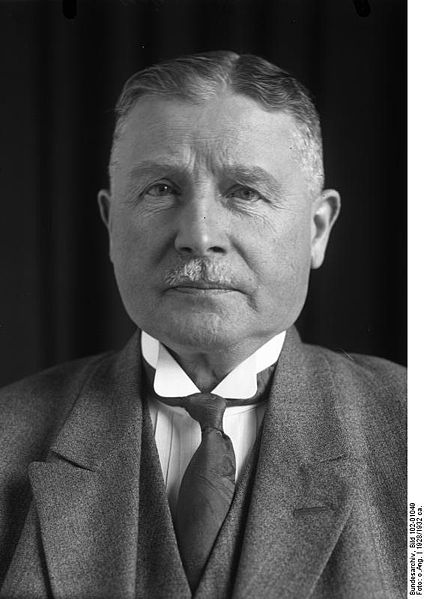
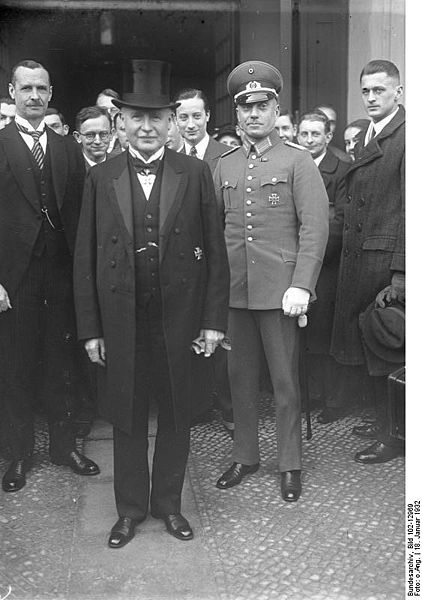
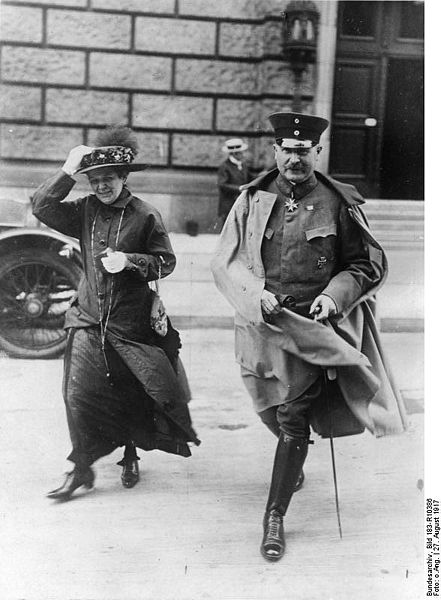
Karl Eduard Wilhelm Groener (22 November 1867 – 3 May 1939) was a German soldier and politician.
He was born in Ludwigsburg in the Kingdom of Württemberg, the son of a regimental paymaster. He entered the Württemberg Army in 1884, and attended the War Academy from 1893 to 1897, whereupon he was appointed to the General Staff (1899). For the next 17 years, he was attached to the railway section, becoming head of it in 1912. In November 1916, he moved into the Prussian War Ministry as deputy war minister and was in charge of war production. In August 1917, Groener served as chief of staff of an army group in Ukraine.
On the resignation of Erich Ludendorff on 29 October 1918, Groener became First Quartermaster General (Deputy Chief of the General Staff) under Field Marshal Paul von Hindenburg. Germany′s military situation was worsening under the onslaught of the enemy, and social unrest and rebellion among both the German armed forces and the civilian population threatened to break out into revolution. In November, Groener advised Kaiser Wilhelm II that he had lost the confidence of the armed forces and recommended abdication to the monarch.
With the Kaiser′s abdication on 9 November 1918 the Marxist Spartacus League had declared a soviet republic in Berlin. Social Democrat leaders Friedrich Ebert (newly named Chancellor) and Philipp Scheidemann sought to forestall the Communists′ action, and — evidently on the spur of the moment — Scheidemann proclaimed the Republic.
Groener, who was second - in - command of the German Army and who had known Ebert from the soldier′s days in charge of war production, contacted the socialist leader that evening. The two men concluded the so-called Ebert - Groener pact, which was to remain secret for a number of years. For his part of the pact, Ebert agreed to suppress the Bolshevik led revolution and maintain the defeated Army′s role as one of the pillars of the German state; Groener in turn agreed to throw the weight of the still considerable Army behind the new government. For this act, Groener earned the enmity of much of the military leadership, much of whom sought the retention of the monarchy.
Groener subsequently oversaw the retreat and demobilization of the defeated German army after World War I ended with the armistice of 11 November 1918.
After his resignation from the army (30 September 1919) to protest the signing of the Treaty of Versailles, Groener was in and out of retirement during the 1920s. He served as Transportation Minister between 1920 and 1923. He succeeded Otto Geßler as Defense Minister in 1928, a post he held until 1932. In 1931, he also became acting Interior Minister, and favored the banning of the Nazi storm troopers (SA). When he rose to defend his views of the banning of the SA in the Reichstag, he was violently attacked by Hermann Goering. The defense minister tried to defend himself, but suffering from diabetes and heart trouble, the old man was overwhelmed by abuse from the Nazi benches. Exhausted and humiliated, Groener left the chamber, only to walk into Kurt von Schleicher, who told Groener he must resign as Defense minister. He appealed to President Hindenburg, but Hindenburg claimed he could do nothing about it. On 13 May, Groener resigned, humiliated and ridiculed throughout Germany, and disappeared from public life.
Groener
was married twice: Helene Geyer (1864 – 1926), with one daughter,
Dorothea Groener - Geyer {b.1900}, and Ruth Naeher - Glück, with whom
he had a son. Groener died in Potsdam - Bornstedt on 3 May 1939.
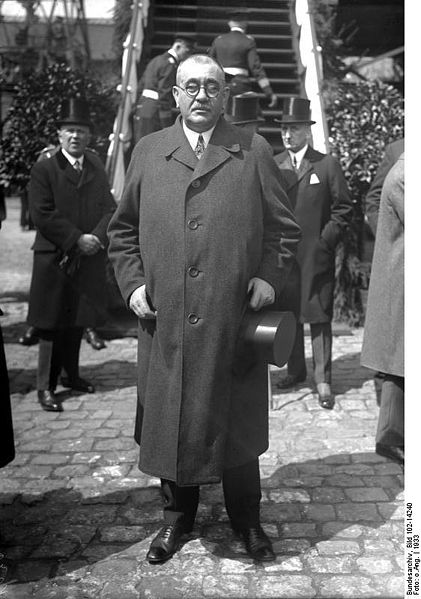
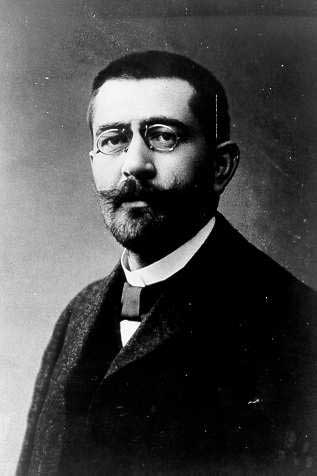
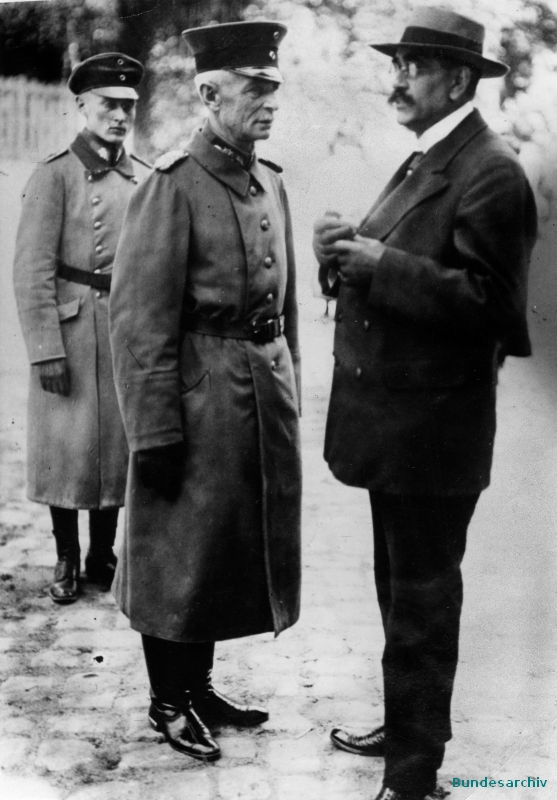
Gustav Noske (July 9, 1868 - November 30, 1946) was a German politician of the Social Democratic Party of Germany (SPD). He served as the first Minister of Defense of Germany between 1919 and 1920.
Noske was born in Brandenburg an der Havel. He was a Master Butcher by trade, who had climbed the political ladder within the trade union movement. He was a member of the Social Democratic Party and became a member of the German Parliament in 1906, where he remained during World War I. He had long shown an interest in military and colonial affairs.
Noske is regarded as a moderate and pragmatic Social Democrat; however, many in the party in his lifetime were angered by such acts as Noske's voting for the construction of new dreadnoughts for the German Navy, at the time when the pre - 1914 Social Democratic Party took a strongly anti - militarist and anti - war position. Noske justified his act by the argument that naval construction created jobs for shipyard workers. In the 1914 - 1918 period, the Party's outspoken support for Germany's participation in the First World War in effect affirmed the deviant position taken by Noske in the pre - war years.
Best known for putting down the Communist and left wing risings throughout Germany in early 1919, Noske was and remains a controversial figure. To crush the incipient revolution, he permitted and even encouraged the organization and employment of right wing, nationalist Freikorps. Between January 10 and January 17, 1919 they, together with Reichswehr troops under the command of General von Lüttwitz, crushed the Spartacist revolt by military force, the leaders - Rosa Luxemburg and Karl Liebknecht - were shot by members of the 1st Horse Guards Division as they were being arrested after the fighting had ended on January 17. On the other hand, he defused the Kiel Mutiny of 1918 without a shot being fired.
One of the few Social Democrats willing to work with the traditional officer class which continued to dominate the Army, Noske was instrumental in restoring order and preventing a German version of the Bolshevik October Revolution in Russia.
Noske was Governor of the Province of Hanover from 1920 on, but was dismissed by the Nazi government in 1933. In 1944 he was arrested by the Gestapo under suspicion of involvement in the July 20 plot against Adolf Hitler. Noske was freed by advancing Allied troops and lived in Frankfurt am Main afterwards. He died while preparing for a lecture tour of the United States.
SPD politician Johannes Kahrs, a leading contemporary representative of the moderate wing of the SPD, has described Gustav Noske as one of his political role models.